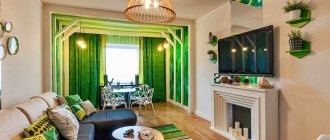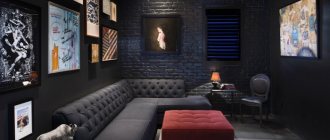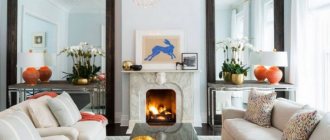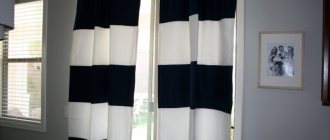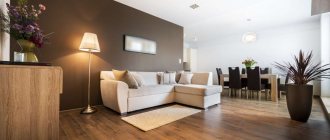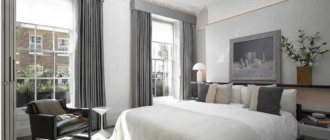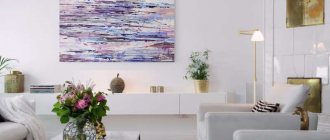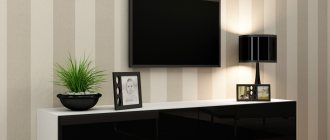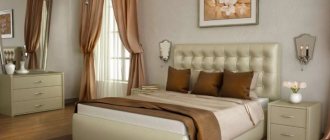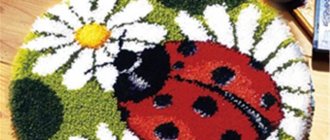Many people think that embroidery is a relic of the past, and it is used only to decorate the interiors of village houses. This is a misconception, because it has never gone out of fashion and remains popular today. Embroidery can be found in the design of classic and modern interiors; it always attracts attention and becomes the highlight of any project. Designers often use it and are not afraid to combine it with objects of different styles.
Modern geometric embroidery for interior decoration
Features of decorating rooms with embroidery
Embroidery in the interior performs an exclusively decorative function. It makes it more homely, cozy, sophisticated and chic. Decorative and applied art is actively used to decorate modern interiors, because it has a number of advantages over other techniques:
- a huge selection of subjects and a variety of colors of products;
- items with embroidery fit into interiors of any style;
- people without experience can learn to embroider beautiful pictures;
- materials for needlework are inexpensive;
- Each piece of decor is unique and therefore valuable.
Embroidered paintings in frames will be the highlight of any interior
Items with embroidery will look beautiful in the interior if they are chosen correctly in style and color scheme. One of the basic rules is that there should not be too many of these things.
It is recommended to think in advance which embroidered items will decorate the room:
- paintings;
- curtains;
- pillows;
- bedspreads;
- furniture covers.
To make these beautiful things noticeable, you need to create a background for them. For example, wallpaper without a pattern is suitable for such paintings, and cross-stitched pillows look better on a plain sofa.
Unusual embroidery in the interior
Creative approaches to hanging pictures
The use of paintings in interior design was mentioned on the pages of magazines back in the 30s of the last century. Agnes Barton's article said that embroidered paintings randomly hung on the walls will not create charm and comfort in the room. A composition of paintings will help give the interior some zest and attractiveness, especially if you can tie it to the design of the decor. A creative approach and creative thinking will help you create a unique design based on embroidered paintings. Only in this case the wallpaper should not interfere with the composition - their pattern may be either small or absent altogether.
Paintings with embroidery in home interiors
Embroidered paintings look stylish and impressive in the interior of an apartment. Among the huge variety of plots, you can always find the perfect one for a specific project. Landscapes, hunting scenes, and ancient castles are suitable for a classic living room.
Embroidery on the tablecloth
In the kitchen, you can hang bright panels on the walls depicting vegetables, fruits, flowers or scenes from village life. For the bedroom, images made in calmer colors are appropriate.
The painting should be noticeable in the room, so it should be placed on a plain wall. Embroidery will not look good against wallpaper with a floral or geometric pattern. It is also important to choose the right frame. A gilded baguette is suitable for classic interiors, and a wooden frame is suitable for loft, Provence, country, shabby chic. In techno and minimalist styles, products are framed in glass or metal.
Diamond embroidery in the interior
Rules for placing embroidered products
If you have those “golden hands”, and embroidery is a pleasant pastime for you, then I don’t see any reason why you couldn’t not place your creations in a prominent place. Unique paintings, panels or embroidered decorations will perfectly reveal your full potential and add a unique atmosphere to your apartment.
True, in order to manage the existing works as profitably and effectively as possible, you should know a few basic rules for placing them in rooms.
The instructions below will help you with this:
- Make sure that the pattern on the wallpaper does not interfere or interrupt the main motif of the picture. The embroidered element is best placed on a plain background or on wallpaper with a small, dim pattern.
- The theme of the embroidery should correspond to the room in which it is located
. Floral arrangements are good for the living room or kitchen, but lush still lifes will look perfect in the kitchen.
- Compositions with a horizontal pattern are best placed on the eye line, so they will be best perceived visually.
- You can try placing embroidered paintings united in one style in one row or in a ladder.
Curtains with embroidery
Curtains and tulle with embroidery will decorate any room in the house. Light curtains with floral patterns have been popular for a long time. They come in gold, white, cream and multi-colored. If the window is large, then tulle with a large pattern is suitable for it, for small ones - with a small ornament.
For classic interiors, curtains made from natural materials, decorated with colored embroidery, are suitable.
Thick curtains made of natural material with bright embroidery will look impressive. For an Indian interior, curtains embroidered with gold are suitable, for rooms in a rustic style - linen curtains with small crosses, for an apartment in the Provence style - curtains with lemons, lavender, and small roses stitched on them.
Embroidery in the kitchen interior
To create a special mood, you can use old embroidery in a modern interior. Such “riches” are sometimes stored in grandmothers’ chests. There you can find beautiful old curtains, which, after cleaning, will become a magnificent interior decoration.
New Year's embroidery for a festive interior
About embroidery
The history of embroidery supposedly began in primitive tribes, when a distant human ancestor fastened several parts of mammoth skin, the sinews of some animal, and a needle from its own bones. This is how the first stitches appeared, with which these same skins were subsequently decorated. Probably, the first attempts at embroidery symbolized the animals that people wanted to hunt, as well as the simplest household items.
Civilization developed rapidly - ox sinews and bone needles were replaced by more convenient tools and materials. The art of colored embroidery spread widely in the Ancient East - it was done on linen and silk fabrics with silk, paper, and gold threads. Also, many peoples practiced embroidery with woolen threads on woolen fabrics and leather, because they were the most affordable. Later, cotton fabrics and threads were invented, threads made from hemp and natural hair were used, and shells, pearls, precious stones, beads, various coins, and bugles were used as decoration.
There are many types of embroidery:
- cross;
- chenille - thin laces;
- satin stitch;
- Richelieu – openwork surface;
- half-cross - tapestry sewing;
- silk;
- ribbons;
- gold and silver threads;
- isothread;
- beads, glass beads;
- Oryol list;
- applique;
- sample;
- parking method;
- diamond, etc.
Each nation has its own unique embroidery techniques: the Japanese embroider on soft balls using the temari technique, in Scandinavia linen, through stitch was popular, in the territory of Ancient Rus' each region had its own method of embroidery. All Russian embroidery was divided into counted embroidery (cross stitch, counted satin stitch, oblique stitch, hemstitch, painting, etc.) and along a drawn contour (stem, chain stitch, Russian satin stitch, oblique stitch, Vladimir stitch, etc.).
Embroidery on pillows: such important little things
Decorative pillows in pillowcases with embroidery will look interesting in any design. You don’t need to use additional decor, but just lay out several of these products on the sofa, and the interior will immediately be transformed.
Place some embroidered pillows on your living room sofa. And the interior will immediately become more comfortable and homely.
In the photo on the Internet you can see that embroidery is especially often used to decorate pillows in oriental interiors. Red, turquoise, and purple pillowcases are made for them, which are embroidered with gold thread. The patterns on pillows are often the same as those on walls and curtains. Thoughts with embroidery also decorate Indian-style interiors. They are made very bright using threads of various colors. For Scandinavian style, plain pillows with a simple pattern are suitable.
Original embroidery in the interior
Embroidered bedspreads and bed linen
In the interior of the bedroom and nursery, you can use embroidered bedspreads and bed linen. Capes should be laid on the bed (if there is none in the room, then it is better to abandon this idea and choose curtains to decorate the room).
Embroidery options for interior decoration
An antique hand-embroidered bedspread is suitable for the bedroom. For a classic interior, choose textiles with floral patterns or complex patterns. For a bed made of dark wood or forged metal, a blanket with red or gold painting is perfect. Eco and Japanese style accepts capes with floral or simple geometric patterns. A new trend has also appeared in Scandinavian interiors - embroidered bedspreads are placed on beds.
Bed linen with stitching looks elegant. Most often it decorates pillowcases or blankets. If you buy products with machine embroidery, pay attention to its quality. The stitches should be made with soft threads that do not fade at high water temperatures.
Wood embroidery
Furniture covers with embroidery
Furniture covers with embroidery will decorate both classic and modern interiors. With their help you can transform an old sofa and armchairs. This option is suitable for those who do not want to change or reupholster their favorite pieces of furniture.
Beautiful embroidery in lilac tones in the interior
The color of the capes should fit into the design and match the walls, floor and other textiles. If the partitions are decorated with geometric patterns, then choose covers with the same embroidery. In order not to overload the interior, the walls and curtains should be plain - against their background, the line pattern on the furniture will look even more expressive.
Photo decorated with embroidery
How to prepare walls for painting?
- Of course, the walls must be well prepared for painting. It is desirable that they be level, although wall “embroidery” with paints can, to some extent, hide unevenness. But, if there are any irregularities, they should be small - after all, embroidery looks better on a smooth, even surface.
- If there are cracks on the wall, fill them with putty and then sand the surface with sandpaper.
- Cover the wall with primer.
- Paint the wall a light color. It does not have to be white - it can be light yellow, sand, light green, slightly pinkish. Or any other shade, but one that will serve as a harmonious background for wall painting.
The paint can be water-based or acrylic.
Interior style with decorative elements with embroidery
Today embroidery can be present in any interior. Some designers find a place for hand-decorated paintings in futuristic directions. But there are styles in which embroidery fits especially well. These include:
- Provence;
- shabby chic;
- Mediterranean;
- rustic;
- ethnic.
Each of these solutions may contain embroidered textiles, paintings, pillows, and decorative items. The main differences are in the color scheme, plot and embroidery technique.
Embroidered decorative pillows in the interior
Embroidery in Provence interiors
For an interior in this style, choose thick curtains made of cotton or linen, decorated with embroidered roses or lavender branches. Printed tulle will look good with them. In such a kitchen there must be towels with a line pattern. On the dining table you can put a tablecloth made of natural material, the edges of which will be decorated with bright patterns. It is advisable to put pillows on the chairs, and if there is a sofa in the kitchen, then there should definitely be a place on it for several embroidered little thoughts.
In a Provence style interior, pillows embroidered with lavender, roses, bicycles and other classic themes will look perfect.
Furniture covers decorated with threads and ribbons will fit well into the living room interior. Any Provence style room can be decorated with small embroidered pictures in olive, purple, yellow or red frames. They should depict French Provence: lavender fields, brown houses, bouquets of flowers, pottery, olive branches and sunny lemons.
Decorating a towel with embroidery
We decorate shabby chic interiors with embroidery
This style was probably invented for romantic natures: shades of pink and pastel colors are used to decorate individual objects and entire interiors. The most popular subject of this trend is roses and birds. They can decorate any pillows, curtains, furniture covers.
Wood embroidery in the interior
A window with cream curtains in a small rose pattern will look original. Place pillows on the sofa, on which flowers are also embroidered with a small cross. For a shabby chic living room, choose furniture covers with large roses or bright birds. This decor will look good against the background of creamy walls and brown floors. Wall sconces and lampshades made of fabric with roses embroidered on them will fit into the living room and bedroom.
Options for embroidered paintings in the interior
Country style and embroidery
Country is also called a rustic direction. A lot of wood and natural textiles are used to create it. Embroidery made with a large, careless cross will be ideally combined with rough wooden beams and textured furniture.
Simple colorful embroidery for interior decoration
For the bedroom and living room, pillows that depict branches with green leaves are suitable. The country interior can be decorated with landscapes in wooden frames. Plain green or beige curtains are suitable for such rooms, but tulle with simple embroidery must be chosen for them.
Embroidery on bed linen
Embroidery for Mediterranean style
Mediterranean destinations are dominated by white, blue, turquoise and dozens of shades of blue. For decoration, you can use products with embroidery. So, striped white and blue pillows or curtains with shells or starfish depicted on them are suitable. It is allowed to use patterns on pillows, curtains, and bedspreads.
The main colors of the Mediterranean interior are blue, white, blue. It is desirable that the embroidery be done in the same color scheme.
The highlight of such a room will be bright geometric patterns. There shouldn't be many of them. The main thing is that they are made in a contrasting color: red, orange, yellow.
Variety of embroidery types
Embroidery for a rustic style
Rustic in its features is similar to country, because embroidery is often used to create coziness. There may not be much of it, but it is what creates the feeling that you are in a village house.
To decorate interior items, use red, blue, and calm green colors. Pastel and bright shades will not work here. The patterns are also made on natural materials, and the paintings are framed in light wood. The most popular decorative item in rustic interiors is the Latin alphabet, embroidered with a red cross in several lines.
Beautiful embroidery in the kitchen
Ethnic style and embroidery
Russian-style rooms are decorated with white textiles depicting red roosters, flowers or patterns. For Indian and Arabic interiors, gold embroidery on bright fabric is suitable, for Japanese and Chinese - hieroglyphs on beige or black material.
Today, embroidery is a popular decorative element (as it was many years ago). It is used to decorate interiors of different styles, but it is best suited for Provence, country, rustic and ethnic. Textiles with line patterns will decorate any room, but only if there is only a small amount of it and the color matches the finishing materials and furniture.
